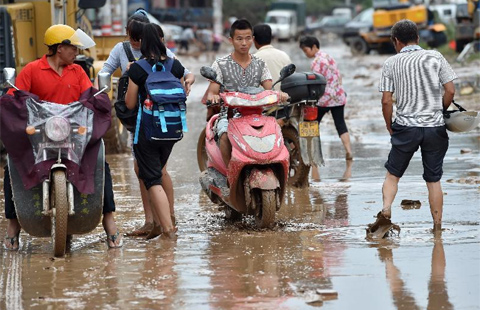Typhoon season expected to be longer than usual
Updated: 2015-07-28 06:49
By XU WEI(China Daily)
|
||||||||
Experts warn of El Nino's effect on mainland climate; nearly half of cities not ready for floods
The impact of El Nino on China is expected to last until the end of this year, and the country could experience stronger typhoons and a longer typhoon season as a result.Ding Yihui, an academic with the Chinese Academy of Engineering and a climate change adviser at the China Meteorological Administration, said El Nino will have a major effect on China, and its impact will last until the end of the year or even into spring.
El Nino, a warming of sea-surface temperatures in the Pacific basin, can cause strong rainfall in the south and droughtlike conditions in the north.
However, this year's El Nino will not match the intensity of the 1997-98 weather pattern. El Nino was blamed in 1998 for massive flooding along the Yangtze River, as well as the Songhua and Nenjiang rivers, which claimed thousands of lives.
El Nino will also disrupt typhoon patterns, with the typhoons that affect China being stronger and the season spread over a longer period, he said.
"The typhoons will come from further south in the ocean, and be more intense," he said at a media briefing on Monday.
Meanwhile, there is a major chance that the Songhua and Nenjiang rivers, both in the country's northeast, will see major flooding in August and September as a result of El Nino, he said.
Ding said the impact of El Nino is most noticeable in the second year of the cyclical event.
Duan Yihong, president of the Chinese Academy of Meteorological Sciences, said at the briefing that typhoons typically originate in the South China Sea during an El Nino year, and the precipitation from a single typhoon has significantly increased in the past decade.
Ding warned that the frequency of extreme weather has increased in urban areas amid the intensive urbanization drive over the past decades.
"The rainfall in urban areas is growing more intense and is now more difficult to forecast due to the 'urban heat island' effect," he said. An urban heat area is a metropolitan area that is warmer than its surroundings.
Flooding has occurred in a number of cities this year, including Shanghai, Wuhan and Nanjing, because of more intense rainfall.
Zhang Jiatuan, a spokesman with the State Flood Control and Drought Relief Headquarters, said at a news conference in May that more than 300 of China's 657 cities do not meet national standards for flood prevention in urban areas, and more than 90 percent of older urban areas don't even meet the lowest criteria for flood prevention.
- Devil is in detail when El Nino strikes
- El Nino leaves NE China thirsty
- Food supplies 'secure' from El Nino impact
- El nino could affect Indonesia's food output
- El Nino impact on China likely 'to be moderate'
- Loong Airlines defends decision to fly in typhoon
- Things back to normal in Fujian after typhoon
- Huge typhoon barrels toward China's east coast
- Typhoon pounds China with heavy rains; 1.1 million evacuated
- Typhoon Chan-Hom lands on E China, disrupts normal life
 Elvis Festival pays tribute to the King of Rock 'n' Roll
Elvis Festival pays tribute to the King of Rock 'n' Roll
 Four-color rice turns paddy field into artwork
Four-color rice turns paddy field into artwork
 Images capture modern life of a warrior monk
Images capture modern life of a warrior monk
 The world in photos: July 20 - 26
The world in photos: July 20 - 26
 Amazing landscape of China in white and black
Amazing landscape of China in white and black
 Across America over the week (July 17- July 23)
Across America over the week (July 17- July 23)
 Unusual but true: 'Love' conquers all
Unusual but true: 'Love' conquers all
 Six dead as rainstorms wreak havoc in China
Six dead as rainstorms wreak havoc in China
Most Viewed
Editor's Picks

|

|

|

|

|

|
Today's Top News
Beijing condemns Somali attack, mourns deaths
China eyes deepened cooperation with overseas NGOs
Monster Hunt breaks Chinese box office record
Olympic bid panel cites city's merits
Astronomers discover most Earth-like planet yet
Seattle Chinatown leader killed in shooting
Flight details of Obama's Kenya trip leaked
2 killed, several injured in Louisiana theater shooting
US Weekly

|

|






